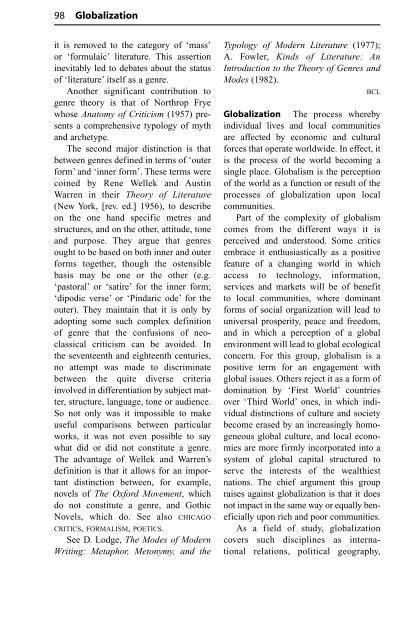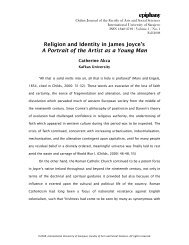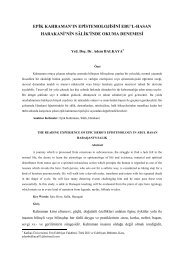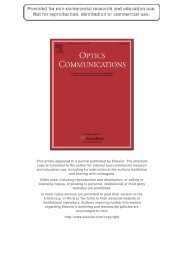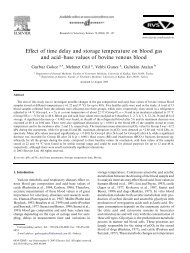The Routledge Dictionary of Literary Terms
The Routledge Dictionary of Literary Terms
The Routledge Dictionary of Literary Terms
Create successful ePaper yourself
Turn your PDF publications into a flip-book with our unique Google optimized e-Paper software.
98 Globalization<br />
it is removed to the category <strong>of</strong> ‘mass’<br />
or ‘formulaic’ literature. This assertion<br />
inevitably led to debates about the status<br />
<strong>of</strong> ‘literature’ itself as a genre.<br />
Another significant contribution to<br />
genre theory is that <strong>of</strong> Northrop Frye<br />
whose Anatomy <strong>of</strong> Criticism (1957) presents<br />
a comprehensive typology <strong>of</strong> myth<br />
and archetype.<br />
<strong>The</strong> second major distinction is that<br />
between genres defined in terms <strong>of</strong> ‘outer<br />
form’ and ‘inner form’. <strong>The</strong>se terms were<br />
coined by Rene Wellek and Austin<br />
Warren in their <strong>The</strong>ory <strong>of</strong> Literature<br />
(New York, [rev. ed.] 1956), to describe<br />
on the one hand specific metres and<br />
structures, and on the other, attitude, tone<br />
and purpose. <strong>The</strong>y argue that genres<br />
ought to be based on both inner and outer<br />
forms together, though the ostensible<br />
basis may be one or the other (e.g.<br />
‘pastoral’ or ‘satire’ for the inner form;<br />
‘dipodic verse’ or ‘Pindaric ode’ for the<br />
outer). <strong>The</strong>y maintain that it is only by<br />
adopting some such complex definition<br />
<strong>of</strong> genre that the confusions <strong>of</strong> neoclassical<br />
criticism can be avoided. In<br />
the seventeenth and eighteenth centuries,<br />
no attempt was made to discriminate<br />
between the quite diverse criteria<br />
involved in differentiation by subject matter,<br />
structure, language, tone or audience.<br />
So not only was it impossible to make<br />
useful comparisons between particular<br />
works, it was not even possible to say<br />
what did or did not constitute a genre.<br />
<strong>The</strong> advantage <strong>of</strong> Wellek and Warren’s<br />
definition is that it allows for an important<br />
distinction between, for example,<br />
novels <strong>of</strong> <strong>The</strong> Oxford Movement, which<br />
do not constitute a genre, and Gothic<br />
Novels, which do. See also CHICAGO<br />
CRITICS, FORMALISM, POETICS.<br />
See D. Lodge, <strong>The</strong> Modes <strong>of</strong> Modern<br />
Writing: Metaphor, Metonymy, and the<br />
Typology <strong>of</strong> Modern Literature (1977);<br />
A. Fowler, Kinds <strong>of</strong> Literature: An<br />
Introduction to the <strong>The</strong>ory <strong>of</strong> Genres and<br />
Modes (1982).<br />
BCL<br />
Globalization <strong>The</strong> process whereby<br />
individual lives and local communities<br />
are affected by economic and cultural<br />
forces that operate worldwide. In effect, it<br />
is the process <strong>of</strong> the world becoming a<br />
single place. Globalism is the perception<br />
<strong>of</strong> the world as a function or result <strong>of</strong> the<br />
processes <strong>of</strong> globalization upon local<br />
communities.<br />
Part <strong>of</strong> the complexity <strong>of</strong> globalism<br />
comes from the different ways it is<br />
perceived and understood. Some critics<br />
embrace it enthusiastically as a positive<br />
feature <strong>of</strong> a changing world in which<br />
access to technology, information,<br />
services and markets will be <strong>of</strong> benefit<br />
to local communities, where dominant<br />
forms <strong>of</strong> social organization will lead to<br />
universal prosperity, peace and freedom,<br />
and in which a perception <strong>of</strong> a global<br />
environment will lead to global ecological<br />
concern. For this group, globalism is a<br />
positive term for an engagement with<br />
global issues. Others reject it as a form <strong>of</strong><br />
domination by ‘First World’ countries<br />
over ‘Third World’ ones, in which individual<br />
distinctions <strong>of</strong> culture and society<br />
become erased by an increasingly homogeneous<br />
global culture, and local economies<br />
are more firmly incorporated into a<br />
system <strong>of</strong> global capital structured to<br />
serve the interests <strong>of</strong> the wealthiest<br />
nations. <strong>The</strong> chief argument this group<br />
raises against globalization is that it does<br />
not impact in the same way or equally beneficially<br />
upon rich and poor communities.<br />
As a field <strong>of</strong> study, globalization<br />
covers such disciplines as international<br />
relations, political geography,


